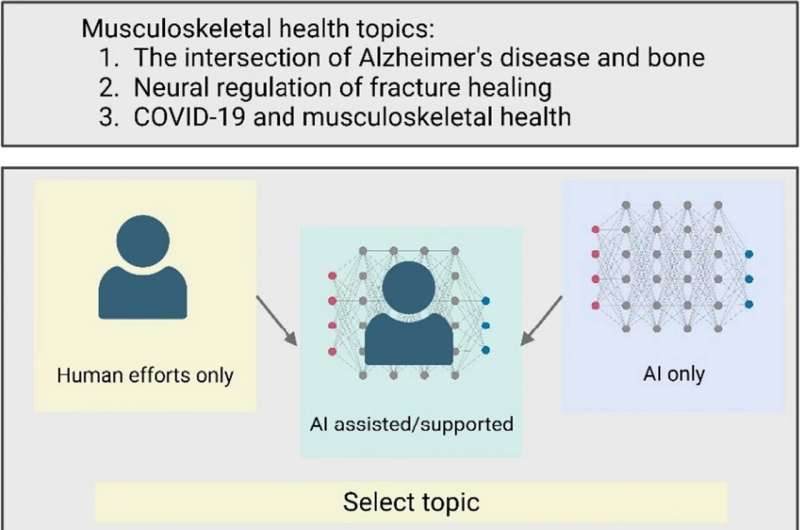This article has been reviewed according to Science X's editorial process and policies. Editors have highlighted the following attributes while ensuring the content's credibility:
fact-checked
trusted source
proofread
Could artificial intelligence help or hurt medical research articles?

Since its introduction to the public in November 2022, ChatGPT, an artificial intelligence system, has substantially grown in use, creating written stories, graphics, art, and more with just a short prompt from the user. But when it comes to scientific, peer-reviewed research, could the tool be useful?
"Right now, many journals do not want people to use ChatGPT to write their articles, but a lot of people are still trying to use it," said Melissa Kacena, Ph.D., vice chair of research and a professor of orthopedic surgery at the Indiana University School of Medicine. "We wanted to study whether ChatGPT is able to write a scientific article and what are the different ways you could successfully use it."
The researchers took three different topics—fractures and the nervous system, Alzheimer's disease and bone health, and COVID-19 and bone health—and prompted the subscription version of ChatGPT to create scientific articles about them.
The researchers took three different approaches for the original draft of the articles—all human, all ChatGPT, or a combination. The study is published in a compilation of 12 articles in a new, special edition of Current Osteoporosis Reports.
"The standard way of writing a review article is to do a literature search, write an outline, start writing, and then faculty members revise and edit the draft," Kacena said. "We collected data about how much time it takes for this human method and how much time it takes for ChatGPT to write and then for faculty to edit the different articles."
In the articles written only by ChatGPT, up to 70% of the references were wrong. But when using an AI-assisted approach with more human involvement, they saw more plagiarism, especially when giving the tool more references up front. Overall, the use of AI decreased the time spent writing the article but required more extensive fact-checking.
Another concern is with the writing style used by ChatGPT. Even though the tool was prompted to use a higher level of scientific writing, the words and phrases were not necessarily written at the level someone would expect to see from a researcher.
"It was repetitive writing, and even if it was structured the way you learn to write in school, it was scary to know there were maybe incorrect references or wrong information," said Lilian Plotkin, Ph.D., professor of anatomy, cell biology, and physiology at the IU School of Medicine and co-author on five of the papers.
Jill Fehrenbacher, Ph.D., associate professor of pharmacology and toxicology at the school and co-author on nine of the papers, said she believes even though many scientific journals do not want authors to use ChatGPT, many people still will—especially non-native English speakers.
"People may still write everything themselves, but then put it into ChatGPT to fix their grammar or help with their writing, so I think we need to look at how do we shepherd people in using it appropriately and even helping them?" Fehrenbacher said. "We hope to provide a guide for the scientific community so that if people are going to use it, here are some tips and advice."
"I think it's here to stay, but we need to understand how we can use it in an appropriate manner that won't compromise someone's reputation or spread misinformation," Kacena said.
More information: Melissa A. Kacena et al, The Use of Artificial Intelligence in Writing Scientific Review Articles, Current Osteoporosis Reports (2024). DOI: 10.1007/s11914-023-00852-0





















